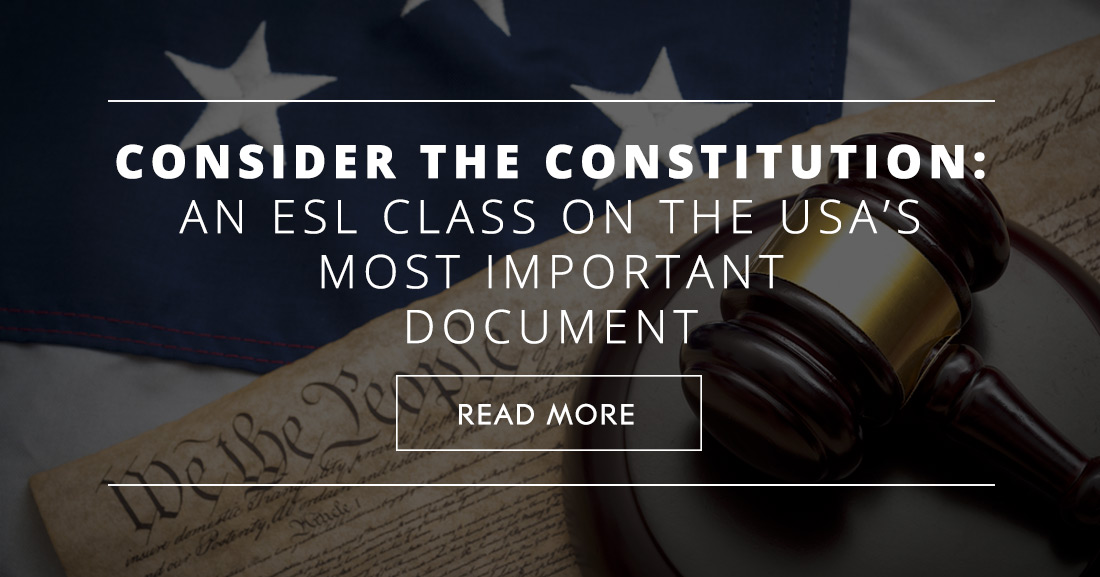
A little quiz to begin, if you don’t mind.
There’s a very famous document which begins, “We the people…”. How much of that famous opening paragraph can you quote? Do your students know it? Here’s the full version:
“We the People of the United States, in Order to form a more perfect Union, establish Justice, insure domestic Tranquility, provide for the common defense, promote the general Welfare and secure the Blessings of Liberty and our Posterity, do ordain and establish this constitution for the United States of America.”
It doesn’t take a constitutional scholar to see the immense power of these words. This will be a document defining how the United States views itself, how it is governed, who may become involved in voting and politics, and how laws are created and enforced. By emphasizing justice, tranquility, welfare and liberty in this seminal opening, the Founding Fathers set out their philosophical stall and codified the relationship between government and people; as Lincoln famously said, four-score and seven years later, it must be ‘government of the people, by the people, and for the people’.
There’s simply no underestimating the potency of these concepts. The US Constitution has gone on to influence countless other similar documents, from China’s new constitution under Sun Yat-Sen to Jose Rival’s documents for the post-colonial Philippines. That very phrase, “We the people…” speaks volumes; this is a legal framework created and affirmed by the public itself, and this notion has had powerful repercussions throughout world politics in the last 230 years.
4 Ideas for an ESL Class on the USA’s Most Important Document
-
1
First Glances and Initial Questions
The language of the Constitution is necessarily complex, and takes on a wonderful eighteenth-century elegance unknown to legal documents of today. However, it’s just this elegant, flowing language which often trips up ESL students, so they’ll need help to decode the Constitution and its amendments. Take things slowly at first, and ask your students to read perhaps one constitutional article per group, and then explain its meaning to the class in simple language.
A good place to start is Article One, Section Two, which sets out the terms of congressional office, and voting conditions. An important anachronism, from our point of view, is the provision for slaves (those other than ‘free persons’) to be counted as part of their state’s population for the purposes of voting and the distributing of federal funding, but at three-fifths the level of a free person. Point out these odd inclusions where the prevailing legal code and social conditions of the 18th century find their way into the constitution itself.
-
2
The Bill of Rights
Honestly, the original articles of the constitution hold little thrill for the layman. They are largely procedural and technical, summing up how the new United States will be governed. The contentious topics are all to be found in the Bill of Rights, the first ten amendments to the constitution. My classes often ask why the Bill of Rights wasn’t included in the original constitution; the answer revolves around the slowness of debate given 18th century technology and travel, and a rolling argument over Federalism, and how much power Washington should exert as compared to the individual states.
This is a great opportunity to look at those odd anachronisms again. Why on earth, for example, is one of these famous ten amendments intended to guarantee that no homeowner can be obliged to allow soldiers to be billeted under their roof? Why, also, would there be a specific amendment allowing individual militiamen (and, according to the Supreme Court two centuries later, individual citizens, too) to sequester firearms in their homes?
Ask your students to research and consider the original context. Private homes were being routinely used by British soldiers as accommodation, and the British were also regularly confiscating arms from colonialists who might pose a threat. Like most others, this legal document intends to cater for the contemporary situation, so ask your students whether these amendments should still stand, or whether they might be abolished or changed.
-
3
Discussing the Amendments
You can go in any one of a hundred directions, but I like challenging my students with some complex questions about the interpretation of the law. In our present era, for example, how does one adequately enforce and interpret the Fourth Amendment, which provides protection from ‘unreasonable searches and seizures’. How does this square with the widespread practice of civil forfeiture among US police departments? Is searching a suspect’s cellphone ‘unreasonable’, for example? What powers of search and detention should the police have, in your students’ view?
And what about the Eighth Amendment, which prohibits ‘cruel and unusual punishment’ (another standard phrase which, like, ‘We the people…’ should be part of your students’ cultural lexicon)? Is waterboarding terrorists ‘cruel’ or ‘unusual’? If not, how far could interrogators go, in your students’ opinion, before the spirit of the Eighth Amendment is entirely shattered?
And while you’re discussing that, throw in the problems created by the Sixth Amendment, which requires for a ‘speedy and public trial’ for criminals. How does this apply to those incarcerated in Guantanamo Bay? Are there exceptions, where a criminal may be required to wait for years before being publicly tried?
Then, ask about the Fifth Amendment. Should people who may have committed a crime receive constitutional protection when on the witness stand, so they aren’t required to incriminate themselves? Or should those who’ve done wrong simply be held to account, whether they’re acting as witnesses or not?
My favorite, though, perhaps unsurprisingly, is the First Amendment, which famously reads thus:
Congress shall make no law respecting an establishment of religion, or prohibiting the free exercise thereof, or abridging the freedom of speech, or of the press, or the right of the people to assemble, and to petition the Government for the redress of grievances.
This is a potential minefield, and I mean that in a good way! Contentious topics are a terrific method of eliciting and practicing lots of useful language, and the more passionate and involved your students are with a particular subject, the more they’re likely to want to say. I love getting into the details of freedom of the press when it comes to headlines which are misleading or articles which are factually wrong. Are journalists still ‘free’ to publish material they know to be scandalously inaccurate? (Bring in a copy of the National Enquirer or another such ‘news source’ to give your students food for thought).
And what about hate speech? Does it abridge your freedom of self-expression if you are arrested during an angry protest against the unacceptable behavior of a certain racial or religious group? Should you be allowed to encourage others to hate, or take action, against those you find objectionable? Where should that line be drawn?
-
4
Discussion Time
It’s likely that most of your students come from countries which have a constitution, and equally likely that it was based on the American model from 1789. If you feel comfortable delving into these topics, ask your students whether their constitution is actually enforced, and whether the rights it provides are enjoyed by all citizens. China’s constitution protects the rights of assembly, just as Madison, Jefferson and the others insisted, but organizing a political demonstration in modern China is a fast track to jail time. Other constitutions claim to offer universal suffrage (the right of every adult citizen to vote) and free, fair elections, but then we find that the winner (usually the incumbent) has somehow garnered 97% of the vote.
What should be our attitude towards countries which appear guilty of this form of hypocrisy? Should we enact a policy of regime change, or impose sanctions to force political reform and support the rule of law? Or perhaps, regardless of the fine words of their constitutions, these countries should be left to interpret their laws how they choose, and rely on popular uprisings and social media pressure to effect change. Ask your students about these problems, bringing in examples from back home where possible.
I became an American citizen a few years ago, and in the days before my ceremony in Boston, read through the constitution several times.
For me, it is a flawed but magnificently inspiring document, a wish-list for how citizens of a mature democracy might treat each other, and expect to be treated by their leaders. As we can see from the vigorous debates which continue today, and the existence of the amendments themselves, the constitution is not a perfect document, and it still requires regular reinterpretation. But in its DNA, its indebtedness to the Greeks and British Common Law, the constitution seeks to codify and enforce some of the most basic rules of human conduct, and in this sense, it is a genuine and powerful force for good.
P.S. If you enjoyed this article, please help spread it by clicking one of those sharing buttons below. And if you are interested in more, you should follow our Facebook page where we share more about creative, non-boring ways to teach English.








